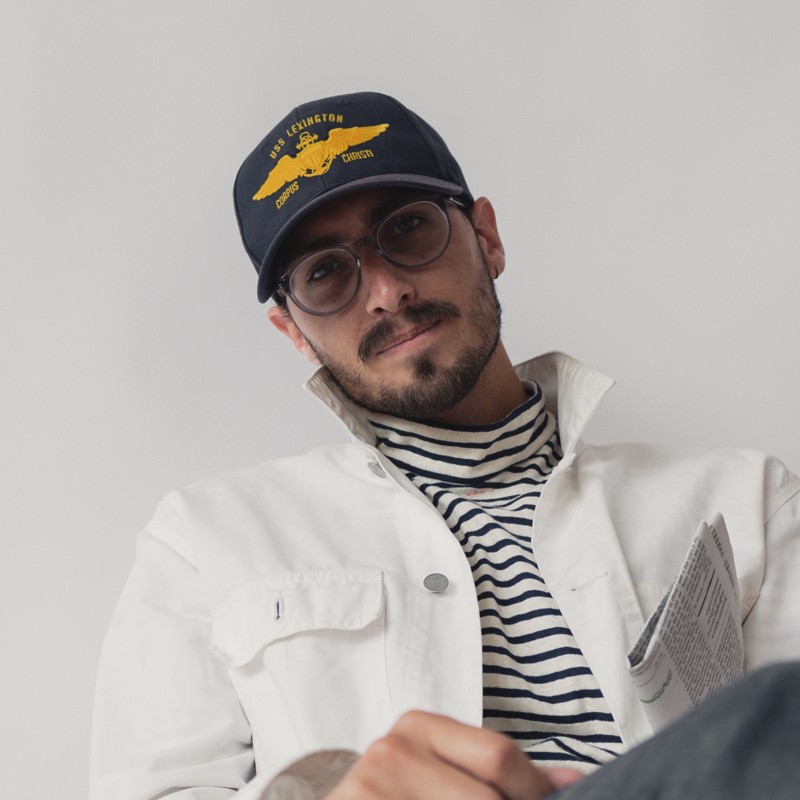Alumnus Joe Rotondo is the proud owner of Rocky Clark Clothing based in New York. Photo Courtesy of Joe Rotondo.
University of Rhode Island alumnus Joe Rotondo has dedicated his fashion company to producing American-made clothing and spreading awareness about sustainability in the fashion industry.
Rotondo started Rocky Clark Clothing, his sustainable denim company, in 2015 when he was still a student at URI.
“It started out more or less as a passion project and a creative outlet for me to educate myself and educate others on sustainability in the fashion industry,” Rotondo said. “During my time at URI we learned a lot about how fashion is one of the most polluting industries in the world, and so I took it upon myself to research what this all meant.”
While researching sustainability as an undergraduate student, Rotondo saw a gap in the fashion industry when he was unable to find a men’s clothing brand that created sustainable clothing produced in America. Seeing this as an opportunity to bridge the gap, he decided to make his own clothing brand and company.
“At first it was this platform for me to have a voice and sort of tell this story, and then as time went on, I started tying products to that message,” Rotondo said. “So we started tying products to it and every collection every year we tried to take it one step further in terms of our product line and in doing that we really found our aesthetic, our voice and our bigger vision for who we want to be as a clothing brand.”
Rocky Clark started out producing hemp t-shirts and hemp hats until recently when they arrived at their signature jeans, which launched in February of this year.
“We’ve been a grassroots company from the start,” Rotondo said. “I was making the products from the beginning and most recently with our jeans, we started to outsource our production right here in New York City.”
Rotondo said that the company is constantly working on fun and exciting projects that take the brand to the next level and continues to communicate who the brand is while educating consumers about sustainability.
While a lot of companies say that they are sustainable and that certain products are sustainable, they do not actually delve into how it is sustainable and therefore consumers are not gaining knowledge on sustainability, according to Rotondo.
“That’s really what we’re trying to bring to light, how are we sustainably producing our goods, why we are sustainably producing our goods, and through our marketing we’re really trying to promote that narrative and say what it really means,” Rotondo said. “And at the end of the day we’re really trying to educate our customers but also offer them a solution to their wardrobe.”
Michaela Lefebvre, who now works at Rocky Clark, attended URI with Rotondo and reconnected with him on Instagram after she saw Rocky Clark’s success. Lefebvre’s natural curiosity for sustainability lended herself well for a partnership with the brand.
“From my perspective, being part of a team that aligns with my inner values is really special,” Lefebvre said.
Lefebvre said that Rocky Clark gives her an outlet to share ideas, have fun and have her voice be heard. She said the company as a whole is helping to change the narrative about how clothing is consumed.
“So many of us use clothing as a means of self-expression, but it pays a big price on our environment and natural resources, and that’s never a good feeling,” Lefebvre said. “Rocky Clark is a thoughtful brand, how can we make pieces that will last? Pieces that people won’t get sick of and throw away after one season?”
Along with educating and having an ongoing conversation with consumers and his small team at Rocky Clark, Rotondo focuses on pushing the boundaries for himself and becoming more sustainable as a company.
“I’m always trying to push the boundaries and take it a step further for every product we develop or every idea we have, I’m always trying to one up myself and do better than last time,” he said. “It’s really putting out more thoughtful goods and growing our audience.”
In spring of 2021, Rocky Clark will be expanding their collection lines. Long-term, Rotondo hopes to become a fully vertically integrated company, where the company has its own farm, grows its own cotton and hemp and has its own manufacturing and seamstresses.





